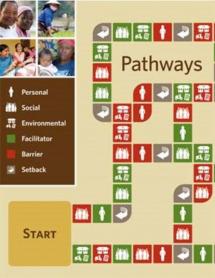Pathways to Change Game – Low Literacy Version
The Pathways to Change game is designed to make the concept of behavior change more understandable. When outreach workers use the game with their communities, it stimulates thinking that can motivate individuals and communities to change. Playing Pathways to Change can also help community health workers and peer educators understand the target population’s perceptions of barriers to change and facilitators of change. When the game is used in this way, it functions as an informal data collection tool that can be helpful for designing and tailoring interventions. This low-literacy version of the game uses simple symbols to represent the factors at the personal, social, and environmental levels that make it harder or easier for someone to make a change in behavior. A second version of the game, designed for use in Uganda, has a glossary of key terms with translations in Acholi, Lango, Iteso, Lukonzo, Luganda, and Swahili. The Moderator’s Handbook is a helpful resource for training outreach workers. The other version of the game can be found here .
Source: Pathfinder
Date of Publication: March 25, 2019
SIMILIAR RESOURCES
Tools
Examples
- Promoting Quality Malaria Medicine through Social and Behavior Change Communication
- Community Communication MNCH e-Manual: Participatory Health Promotion Sessions
- The Infection Control Symbol Package
- SBCC for Malaria in Pregnancy: Strategy Development Guidance
- Infection Control Symbol Templates
- The Future of Malaria Social and Behavior Change Communication
- Promoting Uptake of Intermittent Preventive Treatment of Malaria in Pregnancy
- Suaahara Training Guidelines and Participant Handbooks
- Men's Health Kit
- How to Support Displaced Populations' Mental Health during Lockdown

